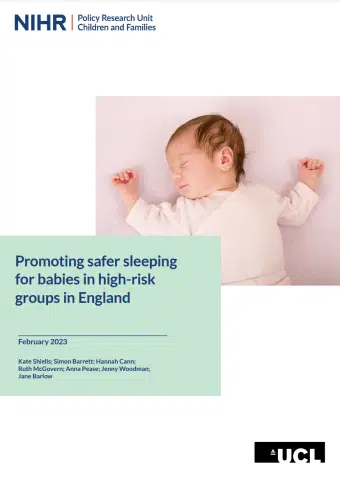A survey of over 3,400 new parents, carried out by The Lullaby Trust, has shown that 9 in 10 co-sleep with their baby. However, only 4 in 10 parents were advised by a health professional on how to reduce the risk of sudden infant death syndrome (also known as SIDS or cot death) if co-sleeping with their baby. Worryingly, some of the parents surveyed also admitted to co-sleeping in very dangerous circumstances. Over 40% said they had fallen asleep on a sofa or armchair with their baby, which can increase the risk of SIDS by up to 50 times. The Lullaby Trust is calling for all parents to be given information on co-sleeping to help save babies’ lives.
Despite its prevalence, only 9% of parents who currently co-sleep with their baby had decided to do so before their baby was born. The Lullaby Trust carried out the survey as part of their annual Safer Sleep Week campaign, which raises awareness of SIDS and the simple steps that parents can take to reduce the risk of it occurring. Over 50% of the parents surveyed had fallen asleep in bed with their baby by accident, with 40% having done so more than once. Parents, knowing the key hazards to avoid and how to prepare their bed, could reduce the risk of SIDS in these situations.
A recent report from the National Child Mortality Database (NCMD) on Sudden and Unexpected Deaths in Childhood highlighted the dangers around accidental and hazardous co-sleeping. Of the SIDS deaths recorded between April 2019 and March 2021, 98% of the babies died when thought to be asleep, and 52% of those babies were co-sleeping with an adult or older sibling. 60% of the co-sleeping deaths were when co-sleeping had taken place unplanned and at least 92% were in hazardous circumstances. Examples of hazardous co-sleeping includes sleeping on a sofa with a baby, or co-sleeping with a baby who was born prematurely or weighed under 2.5kg or 5½ lbs when they were born.
The survey shows that many parents will co-sleep with their baby at some point, either by choice or by accident. The Lullaby Trust is urging health professionals to have discussions with all families about co-sleeping, both before and after their baby is born, regardless of where they plan to sleep their baby.
Jenny Ward, Chief Executive of The Lullaby Trust said:
“Co-sleeping needs to be discussed with all families. It is really important that parents feel able to have open conversations about co-sleeping with health professionals so they get the right advice. Most parents will co-sleep at some point, whether this is planned or unintentional. Simply telling parents not to co-sleep, or not discussing co-sleeping at all means that a lot of families could miss out on vital safer sleep advice that would help to reduce the risk of SIDS for their baby. The NCMD’s report shows that babies die in hazardous co-sleeping situations. To prevent further deaths, it is really important that parents are supported in planning their baby’s sleep. Every parent, regardless of where their baby sleeps, needs to know about both the risks of bringing a baby into an adult bed, and how to prepare the bed in case co-sleeping happens, intentionally or not.”
The Lullaby Trust advises parents on how to co-sleep more safely:
- Keep pillows and adult bedding away from your baby or any other items that could cover their head or cause them to overheat. A high proportion of babies who die as a result of SIDS are found with their head covered by loose bedding.
- Follow all The Lullaby Trust’s other safer sleep advice to reduce the risk of SIDS, such as sleeping baby on their back.
- To reduce the risk of accidents, do not bring other children or pets into bed with you.
- Make sure or check that your baby cannot be trapped, wedged or fall out of bed or get trapped between the mattress and the wall.
- Never leave your baby unattended in an adult bed
Never fall asleep on a sofa or armchair with your baby. The risk of SIDS is 50 times higher for babies when they sleep on a sofa or armchair with an adult. They are also at risk of accidental death as they can easily slip into a position where they are trapped and can’t breathe.
Co-sleeping with your baby is very dangerous if:
- you or anyone in the bed has recently drunk any alcohol
- you or anyone in the bed smokes
- you or anyone in the bed has taken any drugs or medication that make you feel sleepy
- your baby was born prematurely (before 37 weeks of pregnancy) or weighed under 2.5kg or 5½ lbs when they were born
In these scenarios, it is always best to put baby in their own clear, flat, separate sleep space, such as a cot or Moses basket. Keeping the cot or Moses basket next to your bed might make this easier.
Co-sleeping animation
The Lullaby Trust has produced a co-sleeping animation for new and expectant parents. This has been released as part of their annual awareness raising campaign, Safer Sleep Week. To view, click on the image below or visit: https://youtu.be/suoccf8D1ns
New guide for expectant parents on planning for the arrival of their baby – coming soon
The Lullaby Trust has also worked in partnership with the Office for Health Improvement and Disparities to produce a guide for expectant parents on planning for the arrival of their baby, including advice on co-sleeping and an accompanying guide for health professionals. This will be launched during Safer Sleep Week, which runs from 13-19 March.






